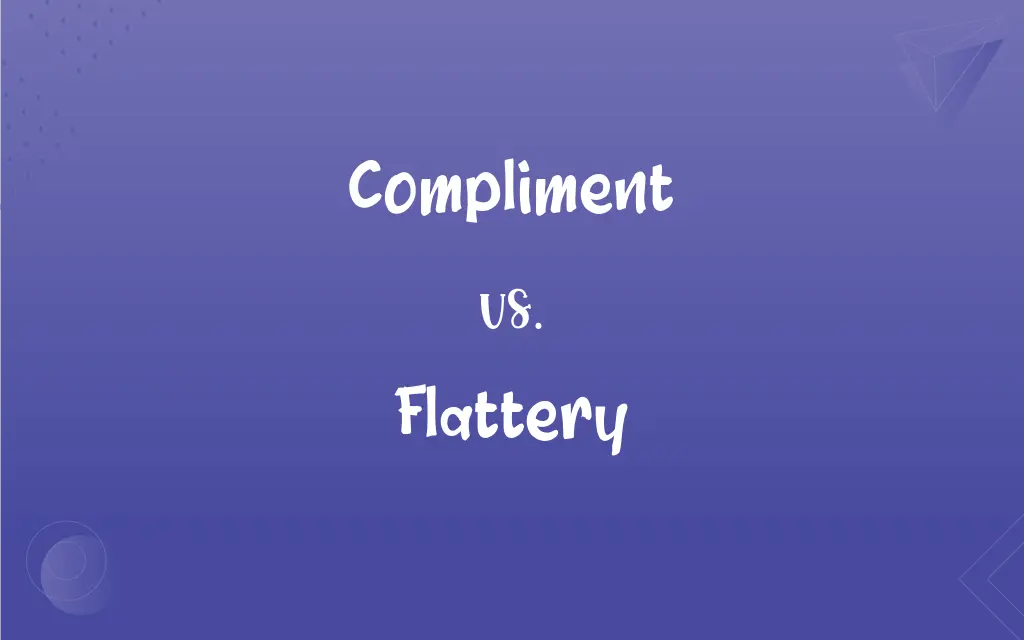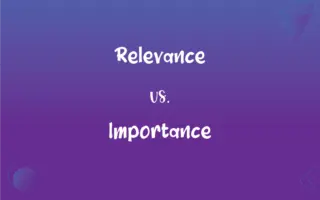Compliment vs. Flattery: What's the Difference?
Edited by Harlon Moss || By Janet White || Updated on September 30, 2023
Compliment refers to a genuine expression of praise or admiration, while flattery is often insincere praise given to gain favor or advantage. Compliments are generally heartfelt, whereas flattery may have ulterior motives.

Key Differences
Compliment and flattery, both nouns, are terms that pertain to the act of praising or admiring someone. However, there are nuanced differences that set them apart. A compliment is a polite expression that sincerely highlights someone's ability, achievement, or favorable quality. Flattery, on the other hand, may also involve praise but is often insincere and driven by an ulterior motive such as gaining favor or manipulating someone.
Grammatically speaking, both "compliment" and "flattery" function primarily as nouns but can also be used as verbs when describing the act of giving praise. To "compliment" someone means to offer genuine praise, while to "flatter" suggests the act may not be completely sincere. For example, you compliment someone's skills because you truly appreciate them; you flatter someone to get something in return.
Contextually, compliments are usually straightforward and given without expectation of anything in return. They are often spontaneous reactions to something admirable. Flattery, conversely, is often more calculated and may be employed strategically to gain some sort of benefit, whether it's favor, influence, or material gain.
Culturally, the perception of what constitutes a compliment or flattery can vary. In some cultures, straightforward compliments are highly valued, while in others, subtlety might be preferred. Similarly, flattery, even if a bit exaggerated, may be considered socially acceptable in some cultures, while being looked down upon in others as deceitful or manipulative.
Comparison Chart
Sincerity
Generally sincere
Often insincere
ADVERTISEMENT
Motive
No ulterior motive
May have ulterior motive
Grammatical Role
Mainly a noun, can be a verb
Mainly a noun, can be a verb
Contextual Use
Spontaneous, no strings attached
Calculated, possibly strategic
Cultural Interpretation
Varies, but generally positive
Varies, may be seen as manipulative
Compliment and Flattery Definitions
Compliment
A polite expression of admiration.
He received a compliment on his excellent presentation.
ADVERTISEMENT
Flattery
Inauthentic or exaggerated praise.
He saw through the flattery and declined the offer.
Compliment
A gift or gesture as a token of appreciation.
She sent a bouquet as a compliment to the host.
Flattery
Compliment given to gain favor.
Her flattery was aimed at getting a promotion.
Compliment
Courteous recognition.
His work received many compliments from the industry.
Flattery
Insincere commendation.
The candidate relied on flattery to win votes.
Compliment
An expression of praise, admiration, or congratulation.
Flattery
The act or practice of flattering.
Compliment
A formal act of civility, courtesy, or respect.
Flattery
Excessive or insincere praise.
Compliment
Compliments Good wishes; regards
Extend my compliments to your parents. See Usage Note at complement.
Flattery
(uncountable) Excessive praise or approval, which is often insincere and sometimes contrived to win favour.
Compliment
To pay a compliment to.
Flattery
(countable) An instance of excessive praise.
Compliment
To show fondness, regard, or respect for by giving a gift or performing a favor.
Flattery
The act or practice of flattering; the act of pleasing by artful commendation or compliments; adulation; false, insincere, or excessive praise.
Just praise is only a debt, but flattery is a present.
Flattery corrupts both the receiver and the giver.
Compliment
An expression of praise, congratulation, or respect.
Pay someone a compliment
Flattery
Excessive or insincere praise
Compliment
(uncountable) Complimentary language; courtesy, flattery.
Flattery
Manipulative charm.
His flattery could make anyone do his bidding.
Compliment
Misspelling of complement
Flattery
Praise with deceitful intentions.
She was cautious of the flattery coming from a rival.
Compliment
(ambitransitive) To pay a compliment (to someone); to express a favourable opinion (of someone).
Compliment
Misspelling of complement
Compliment
An expression, by word or act, of approbation, regard, confidence, civility, or admiration; a flattering speech or attention; a ceremonious greeting; as, to send one's compliments to a friend.
Tedious waste of time, to sit and hearSo many hollow compliments and lies.
Many a compliment politely penned.
Compliment
To praise, flatter, or gratify, by expressions of approbation, respect, or congratulation; to make or pay a compliment to.
Monarchs should their inward soul disguise; . . . Should compliment their foes and shun their friends.
Compliment
To pass compliments; to use conventional expressions of respect.
I make the interlocutors, upon occasion, compliment with one another.
Compliment
A remark (or act) expressing praise and admiration
Compliment
Say something to someone that expresses praise;
He complimented her on her last physics paper
Compliment
Express respect or esteem for
Compliment
Sincere praise or commendation.
Your compliment made my day better.
Compliment
A flattering remark.
She blushed at the compliment on her appearance.
FAQs
Can Flattery be a verb?
Yes, "to flatter" means to give praise, often insincerely, for personal gain.
How do Compliment and Flattery differ?
Compliments are generally sincere, while flattery often has ulterior motives.
What is Flattery?
Flattery is often insincere praise given to gain favor or advantage.
Is Compliment always positive?
Generally yes, as it aims to express admiration or approval.
Is Flattery always dishonest?
Not necessarily, but it often carries a connotation of insincerity.
How should one respond to Flattery?
Caution and skepticism are advised when responding to flattery.
What is a Compliment?
A compliment is a sincere expression of praise or admiration.
Can Compliment be a verb?
Yes, "to compliment" means to offer genuine praise.
Is Flattery always negative?
Not always, but it is often viewed skeptically due to potential ulterior motives.
Can Flattery ever be a form of Compliment?
While both involve praise, flattery can be a form of compliment if it is sincere, though this is rare.
Can Compliments be harmful?
Generally no, unless they are false and intended to deceive.
How can one spot insincere Flattery?
Look for exaggeration or praise that aims to gain something in return.
Are Compliments culturally universal?
While the act of complimenting exists universally, how it's expressed can vary by culture.
How should one respond to a Compliment?
A simple "thank you" is generally an appropriate response.
Is Flattery more prevalent in certain professions?
Yes, in professions that involve persuasion like sales or politics, flattery is more common.
About Author
Written by
Janet WhiteJanet White has been an esteemed writer and blogger for Difference Wiki. Holding a Master's degree in Science and Medical Journalism from the prestigious Boston University, she has consistently demonstrated her expertise and passion for her field. When she's not immersed in her work, Janet relishes her time exercising, delving into a good book, and cherishing moments with friends and family.
Edited by
Harlon MossHarlon is a seasoned quality moderator and accomplished content writer for Difference Wiki. An alumnus of the prestigious University of California, he earned his degree in Computer Science. Leveraging his academic background, Harlon brings a meticulous and informed perspective to his work, ensuring content accuracy and excellence.































































